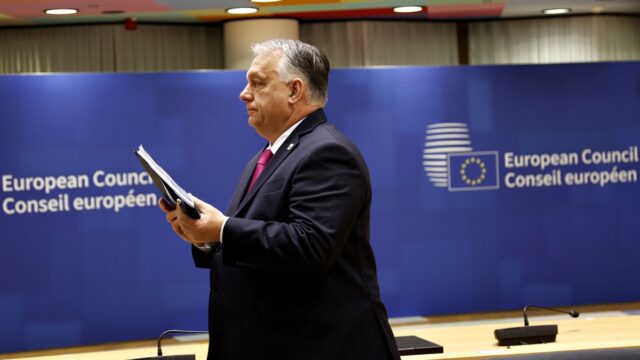The first round of talks between the EU and Ukraine will take place on June 25, after member states approved the general framework of the negotiations.
Ukraine’s ambitions to join the European Union could be blocked for six months after Hungary assumes the rotating presidency of the Council. From July 1 to December 31, Viktor Orbán’s government will be in charge of the weekly agenda and will chair the ministerial meetings in Brussels, deciding which issues are prioritized and which take a backseat.
The official motto of the presidency will be “Make Europe Great Again”, a nod to Donald Trump. A choice that has caused unrest among diplomats, who fear that Orbán will take advantage of this privileged position to promote his nationalist and far-right views. In particular, the bloc’s Ukraine policy – which the prime minister has vocally contested and at times blocked by exercising his veto – is seen as It is the one most at risk of derailing.
On Tuesday, when Budapest unveiled the official Presidency programme, these fears seemed to be confirmed: János Bóka, Hungarian Minister of European Affairs, made it clear that his country would not help kyiv to open any of the 35 chapters that make up the six thematic groups of the accession negotiations. “According to my expectations, the question of opening chapters will not arise at all during the Hungarian Presidency,” said Bóka.
He 21 page program makes several allusions to Ukraine in relation to the economy, territorial integrity, reconstruction, security implications, refugees, war crimes and free movement, but not in the context of enlargement. “The enlargement process must contribute substantially to the improvement of the situation of national minorities,” reads the text. (Orbán has repeatedly complained about the lack of protection for the Hungarian minority in Ukraine, which kyiv has addressed by amending legislation on education and minority languages.)
The tone contrasts with that of Belgium, the current holder of the rotating presidency, which strove to maximizing Ukraine’s accession bid. The last weekBelgium managed to achieve the necessary unanimity to approve the negotiating framework for Ukraine and Moldova, which Hungary had blocked.
This development will allow Belgium to hold the first intergovernmental conference with Ukraine on June 25. In other words, the first round of talks. “Excellent news from Brussels,” declared Olga Stefanishyna, Ukrainian Deputy Prime Minister. “We move on to the next phase of our accession.” The momentum, however, will likely be cut short.
Curb enthusiasm
During Tuesday’s press conference, Bóka stated that his country will try to make the enlargement process “based on merit, objective and credible” and that political attention shifts from Ukraine to the Western Balkans. “What we have seen is that in certain Member States (and) institutions there are a kind of enthusiasm for enlargement by, clearly, the eastern trio”, Bóka said, referring to Ukraine, Moldova and Georgia.
“The Presidency has set the objective that part of This enthusiasm will spread to the Western Balkans so that all of them can (be) one step closer to accession,” he noted. Bóka said that it would be “realistic” for Serbia, a perennial candidate that has been progressively moving away from EU rules, to open a new group of chapters during the Hungarian presidency, while Montenegro should unlock “as many chapters as possible.” He added that a new intergovernmental conference should be held for North Macedonia and Albania, whose candidacies are advancing in parallel.
Regarding Ukraine, Bóka noted that the process could “continue” after the June 25 meeting, but this should be done “in the prescribed manner” and only after the European Commission carries out the scrutiny necessary to examine Ukraine’s ability to join the bloc. He then clarified that opening new chapters for kyiv would not be considered “at all” in the next six months.
Enlargement policy, like foreign affairs, taxation and the common budget, is governed by the principle of unanimity, which means that a single country can stop a decision agreed by the other 26 member states. Orbán has widely used this principle to obtain concessions and paralyze agreements, especially in relation to Ukraine and Russia. Hungary currently prevents the disbursement of 6.6 billion euros of EU military aid to Ukraine, a blockade that began in May last year and shows no signs of breaking anytime soon.
Zoltán Kovács, international government spokesman, Has refusedbefore ruling out the use of the veto power during the presidency, something that, if it occurred, would seriously aggravate tensions between Hungary and its peers.
On Tuesday, Bóka promised that the country would act as a “honest broker” and would work “loyally.” However, he added, Hungary “represents a very clear European alternative. And this vision of Europe will also be represented in our work.”
Asked about himongoing debate On senior EU officials, Bóka reaffirmed Hungary’s opposition to the re-election of Ursula von der Leyen as President of the European Commission, but said there were no objections to the candidacies of António Costa (European Council) and Kaja Kallas (High Representative). Leaders are expected to seal the deal on June 27.







